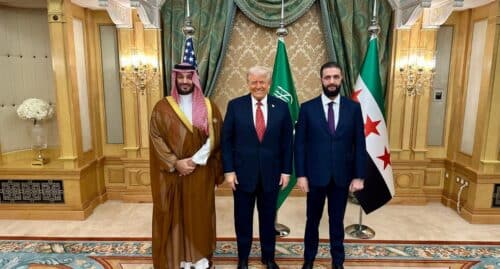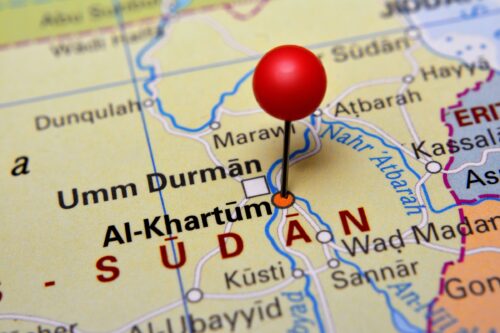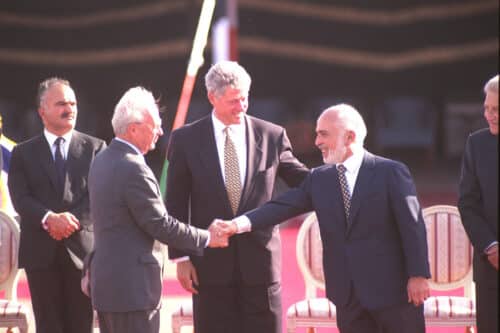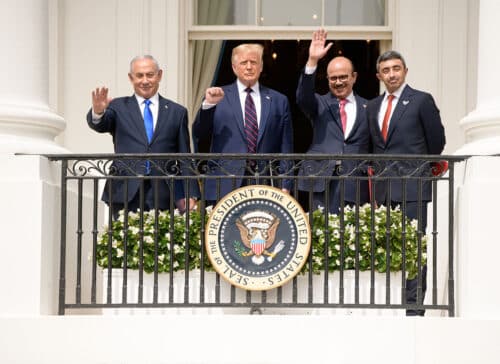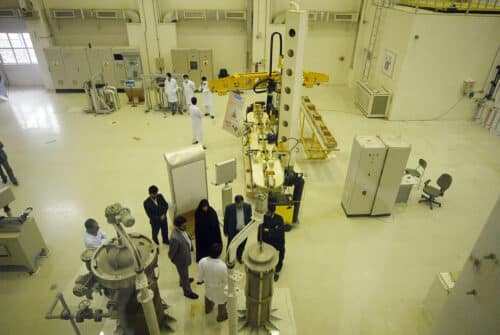The gap between Brigadier General (Res.) Hasson Hasson’s many operations, for some of which he had received various commendations, and what can be told about them, is huge.
As someone who served for 36 years in a variety of senior and sensitive positions in the security apparatus, and later on the National Security Council and as Military Secretary to the President of Israel, Hasson’s military and security career is heavily classified. Despite which, we asked him to provide us with several insights on the lurking danger of Iran and the ways to deal with it.
The First Druze Officer Drafted to the Operations Department of the Intelligence Directorate
Hasson knows the Arab world from every possible angle. He was born and raised in Daliyat el-Karmel, to a family with many members who served in various positions in the security apparatus. His father was the first Druze to go to officer school following the passage of the mandatory conscription law for the Druze community. During the First Lebanon War, Hasson and his father fought in parallel theaters: he as a soldier and his father as a regiment commander in the reserve. After being drafted to the Golani Brigade, he moved rapidly up the chain of command to the position of company commander, but just before being appointed as deputy regiment commander, he was recruited to the Intelligence Directorate by Amnon Lipkin-Shahak, then the Head of the Intelligence Directorate.
Hasson also holds a bachelor’s degree in law, a master’s degree in social sciences and an honorary doctorate from the Interdisciplinary Center in Herzliya.
We sat down with Hasson in order to hear the perspective of a skilled and experienced intelligence operative on the Israeli-Arab Conflict, the Iranian threat and the in-depth processes that are occurring underneath the surface in the Middle East.
Iran Transformed the Arab Countries into Strong Allies for Israel
Hasson, let’s start with the toughest question: Is there a solution for the Israeli-Palestinian Conflict?
As sad as it sounds, I can see no solution to the conflict. Every solution proposed on the subject is complicated and infeasible. Even if we listened to the most moderate voices in the Palestinian world, we would hear those who agree to the “one state for two peoples” solution. Ostensibly, they agree with Jabotinsky, but before we rush to sign any agreements, we need to understand that this stems from the Palestinian’s greater population growth rate. Even if we take into account the rates of Jewish Aliyah from the diaspora and those undergoing the conversion process here in Israel, we would still be a minority overtime. We cannot give them a state because they’re not ready for it, and we can’t control them militarily because we don’t have the manpower and the resources for it. Therefore, the status quo is here to stay.
Is the Palestinian problem still at the top of the Arab world’s list of priorities?
That depends on who you ask, and I’ll explain. The leaders of the Arab countries have a clear interest to cooperate with Israel. If you open a map of the Middle East, you’ll see Iran sitting and breathing down the neck of the United Arab Emirates, Kuwait, Oman, Qatar and Saudi Arabia. This is the reason for example that Khalifa bin Zayed, President of the United Arab Emirates, wanted the airplanes and the UAVs after the signing of the Abrahamic Accords – Israel is a military power.
So, what interest do they have in raising the Palestinian problem?
Unlike the leaders, the people are interested in other things: they want to see the Palestinian issue resolved. You need to understand, there are many Palestinians in the Arab World. If you look at Jordan, 7 million out of the 10 million residents are foreign immigrants. Therefore, it is the 3 million Palestinians, who hold key positions, who maintain the political stability in the country. This creates a situation whereby the leaders in the Arab world want to cooperate with Israel, but in order to keep the peace among their people and maintain the political stability within their country, they must address the Palestinian issue whenever they sit down with our political leadership.
Can we say that there are currently Arab countries that are even greater allies of Israel than the United States?
Unequivocally – yes. Iran has become a common enemy of the Middle Eastern countries. Look at Israel’s policy over the last few years concerning the countries in the region: we have intelligence and operational cooperation with Egypt. Our strongest alliance in the region is with Jordan. Bahrain, Kuwait, the United Arab Emirates, Saudi Arabia – they signed normalization agreements in the Abraham Accords. I can tell you that Qatar and Oman will also join them later on. All these processes are occurring because Iran constitutes a problem, and everyone understands that Israel is the solution. Do you understand what Iran did? It basically unified many Middle Eastern countries – Israel and Arab countries – into a single front opposed to it.
The Iranian Threat: “the Revolutionary Guard is on the fence, Iran is just around the corner”
What is Iran’s obsession with us?
The Iranians have no conflict with the Jewish people. For 3,000 years the Persians and the Jews were good friends. The Iranians also have nothing to do with Palestine: Neither Jerusalem nor the Temple Mount. However, the Palestinian narrative promotes the Iran’s ultimate goal, which is to apply Sharia law throughout the world. In order to do this, Iran will conquer the Middle East and have in the meantime achieved control over 60%-70% of the region. After conquering the Middle East, they will continue to conquer the remaining continents. This is where Israel enters the picture: we are the most threatening regional power in the Middle East. If Iran defeats Israel, it opens the door to conquering the rest of the Middle East. Tehran understands that all the tension around Jerusalem offers an opportunity to promote the destruction of Israel.
Iran cooperates with Islamic Jihad and Hamas, but behind closed doors they would prefer Islamic Jihad over Hamas, which is a point we need to take into account. We saw a living example of this not so long ago: the Head of the Iranian Revolutionary Guard spoke to the Palestinians, with Nasrullah to his right and Yahya Sinwar to his left. This was an exceptional and unprecedented event.
Can Iran, which is thousands of kilometers away from us, pose a real threat to Israel?
The Iranian threat is not located in Tehran, far away from us. The Revolutionary Guard is already on the fence, Iran has tightened the belt around Israel in a way that can no longer be ignored. The Iranians are stationed de facto in the southern Syrian Golan Heights and reconnoitering us. Hezbollah is not the small guerilla force it used to be, it is the Iranian division and front in our area. It is important that we understand that Iran is already here, just around the corner.
And what about the nuclear threat – does an Iranian nuclear bomb change the rules of the game?
The Iranians won’t rush to use their atom bomb. However, they understand perfectly well what the significance of the atom bomb is. I’ll tell you a story: A few years ago, I asked Shimon Peres, then President of Israel, why he drove Ben Gurion and the entire political leadership crazy to build the nuclear reactor in Dimona. At the time, it seemed irrelevant and detached from reality: it was the height of the austerity period, the IDF didn’t have enough ammunition and food was handed out on a budget. You know what he told me? “Listen, when Anwar Sadat landed in Israel in 1977, he was asked why, during the Yom Kippur War, after the Bar Lev line was taken, the Egyptian forces didn’t continue all the way to Tel Aviv – after all, the whole way was cleared of IDF forces. He answered: ‘Are you nuts? You have Dimona'”. You can understand from this story why Iran wants an atom bomb. Iran wants to be the first Middle Eastern country after Israel that has nuclear capabilities. They see what’s going on in Ukraine and see how Putin is using his nuclear capabilities to garner political, geopolitical and economic benefits. So, you can say that the atom bomb constitutes and insurance policy for Iran.

As a senior security expert: is Israel ready to deal with the Iranian threat?
Yes, we certainly have the technological and cyber capabilities to bring about Iran’s collapse. The only ones who dare deal with Iran in the Middle East is the State of Israel. Even when they attacked Saudi Arabia and the United Arab Emirates – no one dared retaliate. I’ll even go further than that: when I asked Princes from the Gulf states why they’re purchasing apartments in Saudi Arabia, they replied that it’s not for business purposes at all – they want to be close to Israel. It provides them security because we are the only ones to provide the defense and the counterweight to Iran.
Can more be done?
Absolutely. What’s being done today is not enough. The State of Israel must change its security-national concept. We need to attack Tehran today. Not Syria, not Iraq and not the various mercenaries. We need to hurt Iran, now.
“The IDSF focuses upon the true threats to Israel”
You were one of the first to join the IDSF Movement. Why?
For a very simple reason: they can advance and solve many problems here. The IDSF Movement can be influential among the people, within the media and the among the political leadership and decision makers. One might say that the IDSF focuses upon the true threats to the State of Israel.
Are you optimistic about the future?
Look, you can say I’ve seen the world. I’ve traveled quite a bit and seen quite a bit. So let me tell you – we are highly appreciated. So yes, I am optimistic. I believe in our abilities, and I believe in our spirit. If we combine the people’s spirit with the Israeli mind that is unparalleled in the world, no one can stand in our way.


